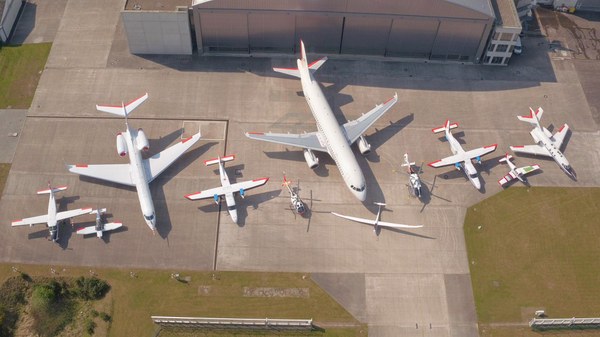DLR’s Flight Operations Facility is responsible for the deployment and utilisation of DLR’s fleet of highly-modified research aircraft.
UpLift Dornier 328-100: D-CUPL

The Dornier 328-100 is being converted into a flying testbed for climate-friendly air transport technologies as part of the UpLift project. The aircraft will be used to measure and quantify the climate protection potential of various new technologies, such as fully synthetic fuels or hydrogen. The aircraft is stationed at the DLR site in Braunschweig, where it is part of the largest civilian research fleet in Europe.
In future projects that are part of the German Federal Government's aeronautics research programme, the flying test laboratory can be used by research institutions and industrial companies – particularly by small and medium-sized enterprises (SMEs) and start-ups that do not have their own facilities for flight tests. This will make it possible to test promising system, propulsion and fuel technologies for the decarbonisation of air transport under real flight conditions in order to significantly accelerate practical deployment. The German Aerospace Center (Deutsches Zentrum für Luft- und Raumfahrt; DLR) is acting as the operator of the new aircraft within UpLift and is conducting the flight experiments. The necessary modifications to the aircraft are largely being developed and implemented by the aircraft manufacturer and project partner Deutsche Aircraft GmbH.
The German Federal Ministry for Economic Affairs and Climate Action (Bundesministerium für Wirtschaft und Klimaschutz; BMWK) is making 45.2 million euros available to fund the procurement of the aircraft as well as its conversion and use as a flying testbed for climate-friendly air transport technologies. Anna Christmann, Federal Government Coordinator of German Aerospace Policy, delivered the funding decision to Anke Kaysser-Pyzalla, Chair of the DLR Executive Board, in May 2023. The funding for the years 2023 to 2025 is part of the BMWK aeronautics research programme 'LuFo Klima', the main instrument with which the German government is supporting the aviation industry on its path towards carbon dioxide neutrality.
Main research topics
The path to climate-friendly air transport first requires a precise understanding of the climate impact of the various system and propulsion concepts under very different operating conditions. For this reason, the aircraft is primarily being equipped to burn fully synthetic fuels and to simulate hydrogen exhaust gases, whose climate impact will be measured and quantified in flight. Building on this, UpLift will enable flight testing of the most promising technology alternatives under real conditions, such as the possible use of hydrogen as a sustainable aviation fuel. DLR's flying test laboratory is open to all technologies and is intended to pave the way for a new generation of aircraft. Together and in close partnership with the aeronautics industry, the air transport industry as well as SMEs and start-ups, the Dornier 328-100 Model 20 gives DLR the opportunity to test their new systems, engines and concepts in flight.
Technical data
UpLift Dornier 328-100 | Data |
|---|---|
Length | 21.3 metres |
Wingspan | 21 metres |
Number of seats (pax / crew) | In passenger configuration: 32 / 3 In flight configuration 2 / 4 |
Maximum take-off weight | 13,990 kilograms |
Propellers | Six blades, 3.6-metre diameter |
Payload | Approximately 3700 kilograms |
Certification category | CS-25 |
Maximum flight altitude (ISA) | 9450 metres |
Maximum flight duration | Approximately six hours |
Maximum cruising speed | Approximately 348 knots TAS |
DLR flight operations | Braunschweig |
Links
- Manufacturer and project partner Deutsche Aircraft GmbH.

